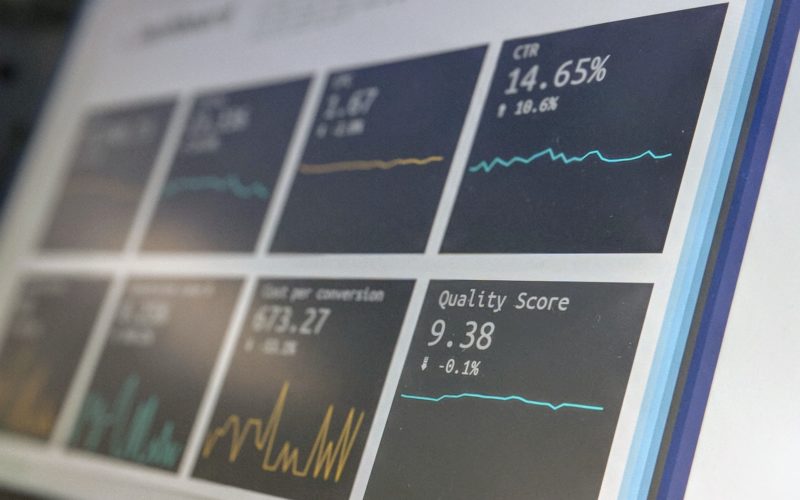If you want to stay one step ahead of the competition, eCommerce analytics tools are essential. The U.S. eCommerce sector generated $870 billion in 2021. By 2025, annual revenues are expected to exceed $1.3 trillion.
These growth forecasts might seem like good news for your business. However, you’ll need the right analytics and an eCommerce business plan, along with website solutions at your disposal, if you intend to remain competitive. Analytics tools make it easy to see which areas you’re succeeding in and where you need to make improvements.
Many analytics tools exist, but finding the right one for your business can be a tall order. If you’re a total novice, you’ll want something user-friendly. Perhaps you’ve been using analytics tools for several years but have now outgrown a limited suite of features. Our guide explores some of the best eCommerce analytics tools for every business.
The Benefits of Ecommerce Analytics Tools
In the digital age, businesses are sitting on a wealth of consumer data that can be used to fine-tune their operations. However, these exhaustive data sets can prove confusing if you’re not managing information correctly. Analytics tools make capturing the right data metrics simple.
Before deciding on an analytics tool, it’s crucial to determine what key performance indicators you want to focus on. These will vary between businesses, but just about every organization will want to prioritize a handful of KPIs.
Firstly, there’s revenue per visitor. In simple terms, this translates to the amount of money you make from a user landing on your site. Next, there are conversion rates. Determining your average conversion rate is simple. Simply divide your website traffic by the percentage of site visitors who end up making a purchase.
Finally, there’s the average user value. This refers to a customer’s average spending on products or services via your site.
Once you’ve captured data on these metrics, you can use the information to refine your operation. You can work on your conversions and lead generation with just a handful of metrics. Furthermore, you can realign budgets for cost-saving benefits and rethink your pricing without losing your competitive edge.
The Best Analytics Tools for Business
If you’re not fully using analytics tools, your eCommerce business is doomed to failure. Read on for our round-up of seven of the best eCommerce analytics tools you should use.
1. Google Analytics
Let’s get the obvious one out of the way first. As far as eCommerce analytics tools go, few solutions beat Google Analytics. Today, 40 million websites use Google Analytics, from home-based merchants to global enterprises.
Although user-friendly, Google Analytics is a multifaceted tool. The Enhanced Ecommerce feature highlights valuable metrics throughout the sales funnel. With this feature, you can see exactly where visitors are dropping off before making a purchase.
Furthermore, you can use Google Analytics to identify precisely where your traffic is coming from and what devices people use. In 2021, mobile commerce revenues hit an all-time high of $359 billion. By 2024, revenues are expected to exceed $728 billion annually. Google Analytics is the obvious choice if you’re looking to convert mobile visitors into sales.
You can also see which pages and products your visitors are engaging with. Once you’ve identified problem pages with high bounce rates, you can refine on-page content. You may already be using Google Analytics. However, if you’re not using the Enhanced eCommerce feature, you only use a fraction of its functionality.
2. Crazy Egg
Crazy Egg is one of the most accessible analytics tools for eCommerce. With its stripped-back dashboard and simplified data metrics, the novice will have no trouble getting started here. Despite being a user-friendly option, Crazy Egg focuses on user experience. If you’re looking to build better buyer journeys, this is one tool worth investigating.
Crazy Egg’s heatmap feature is particularly innovative. With this, you can easily identify the most popular parts of your website and which corners struggle to garner interest. This analytics tool also supports site recording. With this at your disposal, you’ll have an invaluable record of what users are up to during every second of their visit.
More general features include A/B testing functionality. If you’ve been considering drastic site changes or constant updates, Crazy Egg can help you plan and automate the process.
This tool is ideal for smaller businesses that might be struggling to contextualize buyer journeys and visitor interactions. The site recording functionality will deliver irrefutable proof of what’s happening once a visitor lands on your site. With this under your belt, you can optimize content for dramatically improved conversion rates.
3. Woopra
Cart abandonment rates are something every eCommerce business must deal with. In 2022, 77% of online shoppers in the United States abandoned their orders before completing a transaction. The cart abandonment rate is even higher among consumers using mobile devices.
If you’re looking to get a handle on the abandonment rate, Woopra is the perfect tool for you. With Woopra, you can quickly identify the points in the sales funnel where users are dropping off. Furthermore, you can determine how long it’s taken the average customer to complete a sale.
There’s no single reason behind abandonment rates, but Woopra allows you to explore them all. You can use this analytics tool to identify whether your payment input fields are causing the issue. You’ll also want to rule out whether the shipping selection is causing you trouble.
Admittedly, Woopra is a fairly targeted analytics tool. However, if cart abandonment is putting a dent in your revenues, this tool is highly effective at increasing conversion rates.
4. Supermetrics
If you’re searching for an analytics tool that can be used for more general applications, Supermetrics is something to consider. Perfect for ad performance, it brings together data from multiple platforms into one central reference point.
You can use Supermetrics to access data from Google Adwords, Shopify, and more. Centralizing data manually can be time-consuming, while the margin for human error is high. With Supermetrics, you largely automate the process while always ensuring you’ve got access to the most up-to-date information.
5. Glew.io
Glew.io is one of the most sophisticated eCommerce analytics suites around. Although there are a lot of advanced features on offer here, Glew.io can be utilized by eCommerce businesses of any size.
You can use Glew.io to identify your best-selling items and product lines instantly. Furthermore, it’s easy to see which products bring relatively little profit. If you’re operating across several platforms, this tool can also be used to centralize data metrics in one place.
Glew.io also allows for incredibly detailed insights into customer behaviour. You can see what’s selling best and to whom. This can help you reassess your product line and rethink your marketing campaigns.
6. Matomo
Many people would have you believe that Matomo is nothing more than a Google Analytics clone. While there’s plenty of commonality between the two, Matomo stands apart with several features geared solely to eCommerce business owners.
You can seamlessly integrate this tool with virtual storefronts like Shopify. Meanwhile, in-depth reporting delivers detailed insights into sales metrics, geographic information, and more.
There’s plenty of room for personalization as well. You can fine-tune reports to determine the overall conversion rate and probe the reasons behind cart abandonment. Furthermore, all your data is stored securely, meaning there are no privacy issues to worry about.
7. Optimizely
If you pride yourself on delivering a streamlined customer experience, Optimizely is the analytics tool for you. The A/B testing functionality of this tool is fantastic, allowing you to play around with fresh techniques to drive conversion rates through the roof.
Optimizely will provide detailed insights into customer behaviour, allowing you to customize the buying journey for your site visitors. What’s more, you can play around with new techniques and streamline sales flows to combat things like cart abandonment rate.
Eager to embrace new forms of customer service? More online retailers are using chatbots as the first line of customer support. With Optimizely, you can test whether such features are suitable for your platform.
Which Analytics Tool Is Right for Your Ecommerce Business?
All of the eCommerce analytics tools discussed above are worth experimenting with. However, the best fit for your business will ultimately depend on what areas need the most focus. Google Analytics has long been considered the best in class, but certain tools are more effective at resolving specific issues.
Looking to experiment with new techniques to engage site visitors? With its sophisticated A/B testing functionality, Optimizely is the way to go if you want to play around with new techniques and improve customer experiences.
Would you prefer a more multifaceted tool that delivers precious marketing insights and eCommerce analytics? Glew.io will not disappoint. If the cart abandonment rate is a constant concern, an analytics tool like Woopra might be the best way.
⸻
Paul Towler is the technical operations director at SmartOffice, a software automation provider that helps companies with their document management systems.












